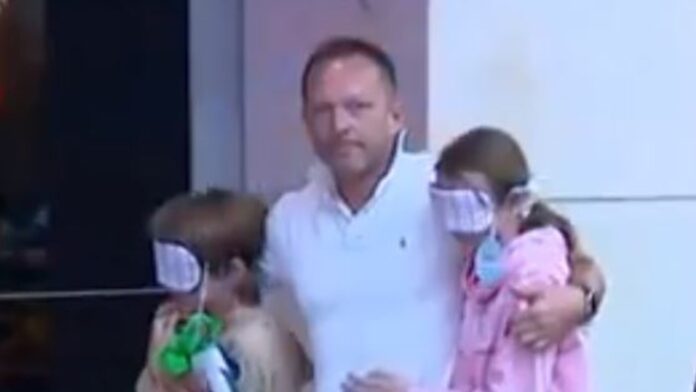[ad_1]
Experts said they were “blown away” by quick thinking parents shielding their children during the Bondi tragedy on Saturday afternoon.
Images have emerged on social media of a heroic father who came out of the shopping centre shielding the vision of two children.
He had covered their eyes with masks and had his arms wrapped them as they exited the building.
Connected Parenting educator and grief counsellor Gen Muir said she was “blown away” by the father’s actions during that moment.
She said as parents we want to shield children from anything that could cause distress or trauma, but it was important to talk to them about what happened in an age-appropriate way.
“Local events and world events, no matter how awful, will be more understandable and less fearful if their context comes from us in a connected and safe way,” she said.
“Underlying anything we experience as humans is emotion, as parents we can be what our kids need us to be when they are having feelings.”
Her biggest tip was to ask children questions about what they already knew.
“The most important message is to tell them is, there is nothing you can’t ask me,” she said.
“By asking them questions about what they already knew we can find out where they are at.
“We can also focus on the safety element.
“Most kids that struggle to process what they heard or might have seen somewhere will show us through their behaviour.
“Behaviour is a big clue to get closer and check in with them.
“If a kid is struggling think about the underlying issue.”
Win Win Parenting family wellbeing expert Dr Rosina McAlpine said one of the big things was to try and keep younger children off social media and avoid having the news on in the background.
Dr McAlpine said it was a different strategy for older children who would likely have their own devices and read about it on the internet.
“You can tell your children that this is a rare event and that it is tragic but it is not something that happens everyday and it is not something to be fearful of,” she said.
“Have open conversations with them and to ask you any questions.
“Reassure them that it is okay to feel scared or worried, these are all normal when events like this happens.”
She said it was really important not to dismiss children or tell them not to worry about it.
“Kids need to express their emotions,” she said.
For children that witnessed the events, Dr McAlpine said it could be more serious than a child who saw something online or on the news.
“If a child has any signs of trauma, or has nightmares or panic attacks or won’t stop crying then get professional help straightaway,” she said.
It is also important for parents to make sure they are okay themselves, because a fearful parent could hinder children’s resilience or ability to overcome it, she said.
“Parents feel overprotective of children and maybe having a meltdown themselves,” she said.
“Be a positive role model, say how you’re not coping but realise it doesn’t happen very often, that this was an exception and we are safe.
“Reassure them that these are unusual times and things like this do not happen all the time.”
Dr McAlpine said it was also a perfect opportunity to teach kids calming techniques by taking deep breaths, listening to quiet music or cuddling a toy or pillow.
“Keep routine normal as much as possible after the event with standard meals and sleeping time,” she said.
“Say yes this happened but we are still doing what we normally would do.”
[ad_2]
Source link


